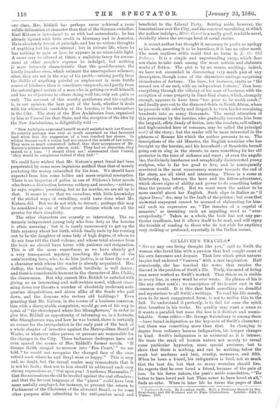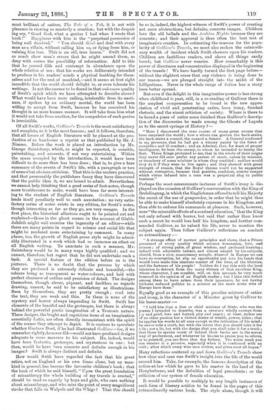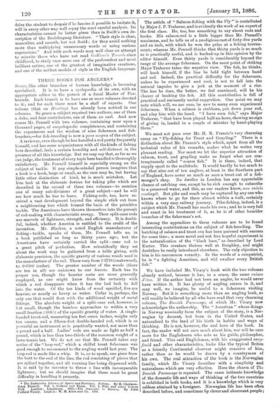GULLIVE R'S TRAVEL S.*
"NEWER any one living thought like you," said to Swift the woman who loved him with a passion that had caught some of his own fierceness and despair. That love which great natures inspire had endowed "Vanessa" with a rare inspiration. Half consciously, she has touched the notes that resolve the discord in the problem of Swift's life. Truly, the mind of living man never worked as Swift's worked. That this is so, is visible in every line, in every word he ever wrote. No phrase of his is like any other man's ; no conception of his is ever east in the common mould. It is this that lends something so dreadful and mysterious to all Swift's writings. To read his life merely, even in its most exaggerated form, is not to realise this to the full. To understand it perfectly, is to feel for once the spirit that breathes in his works. Its quality may want a name as it wants a parallel, but none the less is it distinct and unmis- takable. Some critics—Mr. George Saintsbury is among them —have found indignation as the key-note of Swift's character ; but there was something more than that. In changing in degree from ordinary human indignation, his temper changes in kind. Swift's indignation is as universal as it is intense. He tears the mask off human nature not merely to reveal some particular hypocrisy, some special pretence, but to show that there is nothing, and can be nothing, below the mask but madness and last, cruelty, meanness, and filth. When he loses a friend, his indignation is loud, not so much that the best die, but that so many wretches should live. He regrets that he ever loved a friend, because of the pain of loss. In his fierce nature, the poet's noble consolation, "'Tis better to have loved and lost Than never to have loved at all," finds no echo. When in later life he turns the pages of that
• Gulliver's Travels. By Jonathan Swift. With a Prefatory Memoir by Geo. Saintsbury; and 180 Coloured and 60 Plain Illustrations. London : John C. Nimmo. 1886.
most brilliant of satires, The Tale of a Tub, it is not with pleasure in viewing so masterly a creation; but with the despair ing cry, " Good God, what a genius I had when I wrote that book 1" Happiness with him is the " perpetual possession of being well deceived." " You should think and deal with every man as a villain, without calling him so, or flying from him, or valuing him less. This is an old, true lesson." Swift did not so much show man's errors that he might amend them, as deny with curses the possibility of reformation. Add to this that be poured filth and contempt in abundance upon the whole relation of sex ; that his works are deliberately intended to produce in his readers' minds a physical loathing for them- selves and for the rest of mankind,—and it seems at first sight incredible that the world should delight in, or even tolerate his writings. Is not the answer to be found in that unhuman quality of Swift's spirit which we have attempted to describe above P What would have been mere railing, intolerable from its nasti- ness, if spoken by an ordinary mortal, the world has been willing to accept from Swift, because he has conceived his thought in no mere human manner. It will take from him what it would not take from another, for the compulsion of such genius is irresistible.
Of all Swift's works, Gulliver's Travels is the most satisfactory and complete, as it is the most famous ; and it follows, therefore, that all lovers of English literature will be pleased at the pro- dnetion of so handsome a reprint as that published by Mr. J. Nimmo. Before the work is placed an introduction by Mr. George Saintsbury, which, as might be expected, is sensible, painstaking, and accurate, if not very entertaining. Within the space occupied by the introduction, it would have been difficult to do more than has been done ; that is, to give a bare summary of the events of Swift's life, with a paragraph or two of somewhat obvious criticism. That this is the modern practice, and that presumably the publishers fancy they have discovered that the public likes it, we are bound to admit. Nevertheless, we cannot help thinking that a good series of foot-notes, though more troublesome to make, would have been far more interest- ing to the student of English literature. Gulliver's Travels lends itself peculiarly well to such annotation ; no very satis- factory series of notes exists in any edition, for Scott's notes, though interesting as far as they go, are very meagre. In the first place, the historical allusions ought to be pointed out and explained—those in the ghost scenes in the account of Glubb- dabdrib might well exercise the ingenuity of an editor—while there are many points in regard to science and social life that might be rendered more entertaining by comment. In many places, too, the growth of English prose style might be admir- ably illustrated in a work which had so immense an effect on all English writing. To annotate in such a manner, Mr. Saintsbury would be in many ways highly qualified ; and we cannot, therefore, but regret that he did not undertake such a task. A special feature of the edition before us is the pictures. There is no doubt that the process by which they are produced is extremely delicate and beautiful,—the colours being as transparent as water-colours, and laid with perfect clearness of outline and precision of detail. The designs themselves, though clever, piquant, and faultless as regards drawing, cannot, be said to be satisfactory as illustrations. Seen by themselves, they are pretty enough ; read into the text, they are weak and thin. In them is none of the mystery and horror always impending in Swift. Swift has elements of the fanciful and the grotesque, but there is always behind the powerful poetic imagination of a Teutonic nature. These designs, the bright and capricious issue of an imagination essentially Latin, are often directly inconsistent with the spirit of the scenes they attempt to depict. It is curious to speculate whether Gustave Dore, if he had illustrated Gulliver—for, if we remember rightly, he never did—would not have produced designs adequate in some measure to his subject. He, indeed, would have been fantastic, grotesque, and mysterious in one ; but then, would he have been concrete and definite enough in his images P Swift is always distinct and definite.
How would Swift have regarded the fact that his great satire, not on England or his own times alone, but on man- kind in general, has become the favourite children's book ; that the book of which he said himself, " Upon the great foundation of misanthropy the whole building of my travels is erected," should be read so eagerly by boys and girls, who care nothing about misanthropy, and who miss the point of every magnificent stroke that falls on Walpole and the Whigs P That this should be so is, indeed, the highest witness of Swift's power of creating not mere abstractions, but definite, concrete images. Children love the old ballade and the Arabian Nights because they are concrete ; and their approval is thus often the best test of imaginative creation. In estimating the reasons for the popu- larity of Gulliver's Travels, we must also reckon the extraordi- nary wealth of incident which Swift showers upon his readers.
Children are fastidious readers, and above all things easily bored; bat Gulliver never wearies. How remarkably is this
power of directness and concentration displayed in the beginning of the travels ! We have hardly turned the first page before—
without the slightest sense that any violence is being done to our reason—we are plunged straight into the midst of the Lilliputians. Never in the whole range of fiction has a story been better opened.
But even if the delight in this imaginative power is less strong when childhood is past, still, in a re-reading of Gulliver there is the amplest compensation to be found in the new appre- ciation of vivid and, penetrating satire, keen irony, finished rhetoric, and the nicest criticism of society. Where is there to be found a piece of satire more finished than Gulliver's descrip- tion of the discoveries he made among the Ghosts of Laputa as to the secret springs of History P-
" Here I discovered the true course of many great events that have surprised the world ; bow a whore can govern the back-stairs, the back-stairs a council, the council a Senate. A General confessed in my presence, that he had got a victory purely by the force of cowardice and ill conduct ; and an Admiral, that, for want of proper intelligence, he beat the enemy, to whom he intended to betray the fleet. Three Kings protested to me, that in the whole of their reigns they never did once prefer any person of merit, unless by mistake, or treachery of some minister in whom they confided : neither would they do it if they were to live again ; and they showed with great strength of reason, that the Royal throne could rot be supported without corruption, because that positive, confident, restive temper which virtue infused into a man was a perpetual clog to public business."
Perhaps the most consummate instance of Swift's irony is dis- played on the occasion of Gulliver's conversation with the King of Brobdingnag, in which the Englishman offered to tell his Majesty the secret of the use of gunpowder, in order that he might thus be able to make himself absolutely supreme in his Kingdom, and thus able to enforce his commands at pleasure. Such, however, were" the miserable effects of a confined education," that the King not only refused with horror, but said that rather than know such a secret he would lose half his kingdom, and further com- manded Gulliver, as he valued his life, never to mention the subject again. Then follow Gulliver's reflections on conduct so extraordinary :-
" A strange effect of narrow principles and views, that a Prince possessed of every quality which secures veneration, love, and esteem ; of strong parts, of great wisdom, and profound learning ; indued with admirable talents, and almost adored by his subjects, should, from a nice, unnecessary scruple, whereof in Europe we can have no conception, let slip an opportunity put into his hands that would have made him absolute master of the lives, of the liberties, and the fortunes of his people ! Neither do I say this with the least intention to detract from the many virtues of that excellent King, whose character, I am sensible, will, on this account, be very much lessened in the opinion of an English reader ; but I take this defect among them to have arisen from their ignorance, by not having hitherto reduced politics to a science as the more acute wits of Europe have done."
Equally good as an example of this peculiar mixture of satire and irony, is the character of a Minister given by Gulliver to his horse-master :—
"I told him that a first or chief minister of State, who was the person I intended to describe, was a creature wholly exempt from j.)y and grief, love and hatred, pity and anger ; at least, makes use of no other passion but a violent desire of wealth, power, titles ; that he applies his words to all uses except to the indication of his mind ; he never tells a truth, but with the intent that you should take it for a lie ; nor a lie, but with the design that you shall take it for a truth ; that those be speaks worst of behind their backs are in the surest way of preferment, and whenever he hoeing to praise you to others, or to yourself, you are from that day forlorn. The worst mark you can receive is a promise, especially when it is confirmed with an oath; after which every wise man retiree, and gives over all hopes."
Many reflections scattered up and down Gulliver's Travels show how clear and sane was Swift's insight into the life of the world around him. Take, for example, the famous description of the action-at-law which he gave to his master in the land of the Houyhnhnms, and the definition of legal precedents ; or the criticism of our system of female education.
It would be possible to multiply to any length instances of each form of literary artifice to be found in the pages of this extraordinarily various book. The style alone, though it will drive the student to despair if he fancies it possible to imitate it, will in every other way well repay the most careful analysis. Its characteristics cannot be better given than in Swift's own de- scription of the Brobdingnag literature. " Their style is clear, masculine, and smooth, but not florid ; for they avoid nothing more than multiplying unnecessary words or using various expressions." And with such words may well close an attempt to reinvite those who have not read Gulliver's Travels since childhood, to study once more one of the profoundest and most brilliant satires, one of the greatest of imaginative creations, and one of the noblest models of style in the English language.




































 Previous page
Previous page